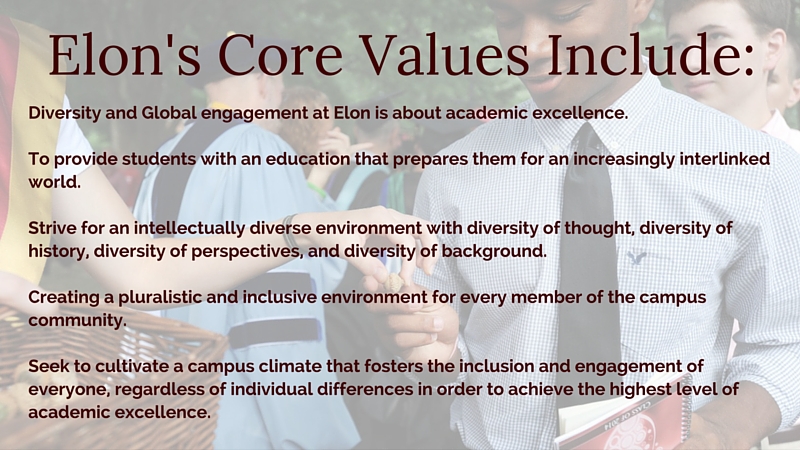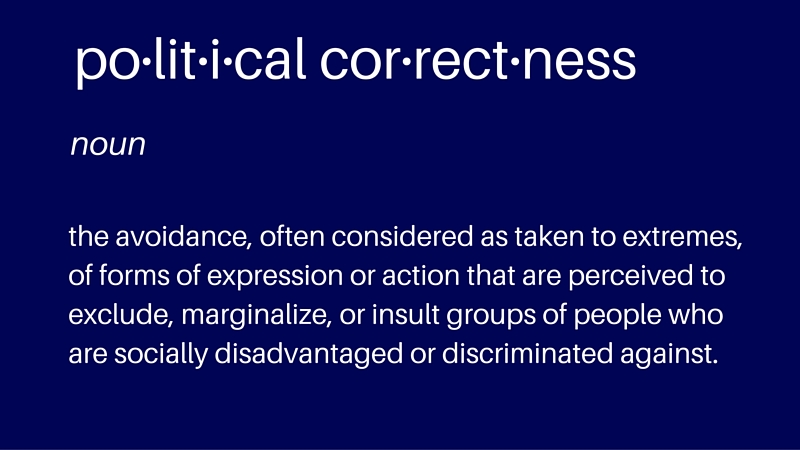From High School To College: Building a PC culture for the sake of inclusion
Political correctness on college campuses is a growing topic of debate across the country. In an interview on MSNBC, Jonathan Haidt, Professor of Business Ethics at NYU Stern School of Business, claimed that the demand for political correctness on college campuses was coming from the students. Haidt is co-author of the recent cover article from The Atlantic, "The Coddling of the American Mind," that explores how the culture of political correctness on college campuses is destroying education and mental health.
Haidt argues that the way the millennial generation was raised may have something to do with it. He says that overprotective parenting is to blame.
"By the time these students get to college, they expect that adults are going to protect them," Haidt said on MSNBC. "And if I feel offended, some adult should be there to protect me."
But what about the delicate period of time right before college? What about the high school years, as students anxiously approach the transition to the next phase of their lives, many with higher education at the peak of priority? It's possible that the politically correct (PC) culture on high school campuses could be playing into what Haidt calls "vindictive protectiveness".
By the time I was a senior, you couldn't get from the dining hall to the school house without hearing 'diversity and inclusion.'"
-Noah Altshuler, Groton School '15
Noah Altshuler graduated from Groton School in Groton, Massachusetts in May of 2015. Groton School is a top ranking preparatory high school. This year it was ranked #3 Most Elite Boarding School in the U.S. by Business Insider. Groton continues to be ranked in the very top for private high schools across several platforms.
Altshuler always felt that the Groton community was generally aware and respectful of differences and sensitivities that result from the effort to be inclusive in a diverse environment. But from the time he was a freshman in 2011, to the time he graduated in 2015, Altshuler said there was a noticeable shift towards a more PC culture on campus. During his four years he observed a slight alteration in dialogue, transforming from an environment of kindness, to a crusade for inclusive comfort.
"By the time I was a senior there was a whole formal mechanism or formal body dedicated to furthering the cause," Altshuler said. "It went from good people caring about kindness to, ‘We’ve got a task force (whether it works or not) that is endeavoring to bring about change.'”
"By the time I was a senior there was a whole formal mechanism or formal body dedicated to furthering the cause," Altshuler said. "It went from good people caring about kindness to, ‘We’ve got a task force (whether it works or not) that is endeavoring to bring about change.'”
Altshuler had several examples to give, particularly in the realm of socioeconomic status. One had to do with a political cartoon drawn by a student.
|
Noah Altshuler
Groton School Class of 2015 |
Another instance regarded a policy change for Athletics in which sports teams were no longer allowed to purchase team apparel.
|
Noah Altshuler
Groton School Class of 2015 |
Altshuler discussed several other instances where the heat was turned up at Groton during the mission to remain politically correct. But he said this mission was driven by the one word that he couldn't stop hearing around campus: inclusion. And to him, being more PC on this ground, was not such a bad thing.
"It was mostly about making sure that no one felt left out and I think that's definitely a positive," he said.
Director of Student Activities at Groton, Tim Leroy, experienced an issue surrounding PC inclusion when he first started working at the school two years ago. It happened when he was planning the annual "Date Dance," a longstanding tradition at Groton.
|
Tim Leroy, Director of Student Activities
Groton School |
Leroy then made a decision to take a year off from the "Date Dance."
"I wanted to avoid it the next year for two reasons," Leroy said. "One because I wanted some time to think about ideas to make it better... and two, because I know if I did schedule it then one way or another somebody was going to be upset about it.”
In terms of preparing students to enter the next phase of life, Leroy feels that Groton is doing its best to find a healthy balance.
|
Tim Leroy, Director of Student Activities
Groton School |
Altshuler believes that preparing to enter the "real world" after high school sometimes could mean learning how to take a hit. But he says that learning about these issues in the classroom is where the real value lies.
|
Noah Altshuler
Groton School Class of 2015 |
"To allow a community to devour itself by perpetuating ignorances in order to maintain a realistic representation of ignorances… now that is not a good idea. I think generally speaking, our aims at political correctness have been aims at inclusion."

At Elon University, political correctness is also a hot topic. Like Groton, inclusion seems to be the main concern.
According to Randy Williams, Dean of Multicultural Affairs, a University should model the marketplace of ideas where the expression of different viewpoints is be encouraged. Williams says that searching for multiple perspectives is the most important way to foster healthy and productive conversation on a college campus.
"If you can have an understanding of why one person would have such tightly held beliefs on a particular subject or issue," Williams said, "then maybe you can have some empathy and be more informed about how you express your comments and your beliefs in a way that will not suppress someone or offend someone.”
Freshman Raechel Brunson said that her transition from high school to college has been positive because of Elon's inclusive nature. Brunson appreciates the nature of sensitive language at Elon.
"It’s not that they are overly politically correct. They just want to make sure they’re doing their best to make sure that nobody feels uncomfortable," Brunson said. "Because somebody feeling uncomfortable or feeling like they can’t speak out about something that offends them should never be a situation that anyone is forced to be in."
But Elon junior Liz Orr thinks that Elon's PC culture has gone too far, to the point where she finds it difficult to express her opinion.
"I think coming to Elon I had to be more reserved with what I said just because of the general culture of this campus. I felt like I couldn’t say what I wanted to say because I would be judged very harshly in my opinion.”
-Liz Orr, Elon Junior
Orr was turned off by the large amounts of diversity emails she says she that she received just for "not being white." She called it a "force."
"I literally got diversity emails everyday being like, ‘diversity study session!’ or ‘diversity Thanksgiving dinner,’" Orr said. "Like no… I can have dinner by myself and I can study by myself, but just because I’m not white I have to get emails being like, ‘please, come to the diversity center if you need help studying!”
Williams says the best way to make progress is to face the conversation head on. To him, that starts in the classroom with the professor. And from there, it's about getting it all out on the table.
"We shouldn’t hide away from issues that may be difficult to express and have a conversation about," Williams said. "To get into those conversations and how to navigate those is a great model for the students. So definitely not avoiding those types of conversations if they should arise in a classroom setting is one way to do that."
Brunson feels that Elon's "politically aware" culture is helping her better prepare for life after Elon.
"In training us and making us aware of what people prefer to be called or what words are offensive or what you shouldn’t say about people of a certain background, they’re acknowledging that certain situations exist and at some point in your life somebody is probably going to be rude to you or do something that really offends you. And I think in making people aware of that and showing different situations and ways you can react to that, they’re also preparing you to react that way in the future."
- Rachel Brunson, Elon Freshman
